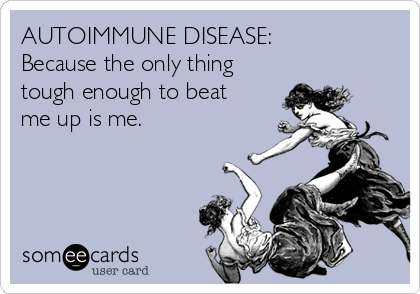So why is it difficult to diagnose these diseases? Frequently, the symptoms are vague. For example, fatigue is commonly associated with a host of autoimmune diseases from chronic Lyme disease to pernicious anemia, but fatigue is also a symptom of the common cold and influenza. Ballantyne's list of symptoms associated with autoimmune diseases includes the following:
- Allergies
- Anxiety & Depression
- Blood pressure changes (usually low)
- Digestive problems
- Extreme fatigue
- Gallbladder disease
- Low blood sugar
- Malaise (generally feeling unwell)
- Memory problems
- Migraines
- Muscle or joint pain
- Muscle weakness
- PMS
- Rashes & other skin problems
- Recurrent headaches
- Resistance to weight loss
- Sleep disturbances
- Susceptibility to infections
- Thyroid problems
- Unexplained weight changes
- Yeast infections
Further, there isn't a singular test to confirm that an autoimmune process is occurring. Currently, the specific autoimmune disease must be identified based on patient history, physical examination, lab testing, and even diagnostic imaging. This very often results in being shuttled back and forth to various specialists in an effort determine the exact diagnosis. However, as this American Autoimmune Related Diseases Association (AARDA) article from Dr. Noel R. Rose of Johns Hopkins explains, we have determined two major components of autoimmunity (the process of the body not recognizing and then attacking itself): genetics and environment. Evidence of genetic factors according to Dr. Rose include the following:
- Family-clustering: family members may each express autoimmune processes although the specific disease may not be the same between relatives.
- HLA mutation: HLA is the name given to human major histocompatibility complex (MHC) genes. This is the "most important single genetic trait in estimating susceptibility to autoimmune diseases."
- Animal models: MHC gene-typing is predictive of autoimmunity in animals.
So if genetics helps us identify autoimmune susceptibility, does an individual with an autoimmune disease have any real hope of controlling (or even eliminating) the condition? The great news is that environment is the other factor associated with autoimmunity, and environment includes the things you eat, inhale, and slather on your skin as well as the things you do to reduce your mental, emotional, and physical stress, which means that you do have power to heal your body and slow (or perhaps halt) the disease process!
AARDA, Dr. Ballantyne's book, and Raymond Francis's Never Be Sick Again are my top three patient resources for learning self-care strategies for autoimmune diseases, but I'm also available to answer your questions about autoimmunity. You can schedule a complimentary consultation with me to determine if I can help you with your condition. Don't give up hope! Start thriving today!




 RSS Feed
RSS Feed
